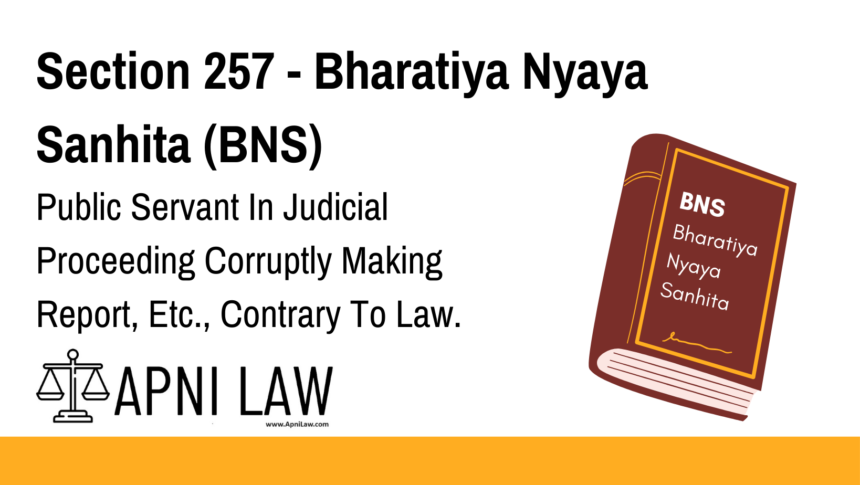Code: Section 257 BNS
Offence: Corrupt Acts by Public Servants in Judicial Proceedings
Whoever, being a public servant, corruptly or maliciously makes or pronounces
in any stage of a judicial proceeding, any report, order, verdict, or decision which he
knows to be contrary to law, shall be punished with imprisonment of either description for
a term which may extend to seven years, or with fine, or with both.
Explanation of Section 257 BNS
Section 257 of the BNSS addresses the serious misconduct of public servants involved in judicial proceedings who intentionally make decisions, reports, orders, or verdicts that are knowingly against the law. This provision aims to uphold the integrity and fairness of the judicial system.
Key Elements of the Offence:
- Public Servant: The person must be a public servant, such as a judge, magistrate, or any officer involved in judicial decision-making.
- Corrupt or Malicious Intent: The act must be committed with corrupt intent or malice, meaning the public servant knowingly acts against the law for personal gain or to cause injustice.
- Contrary to Law: The report, order, verdict, or decision made must clearly contradict established legal principles or statutory provisions.
- Punishment:
- Imprisonment for up to seven years (either rigorous or simple imprisonment).
- A fine, or both imprisonment and fine.
Illustration
Example 1: Malicious Judicial Order
A magistrate knowingly issues an arrest warrant without proper legal grounds, intending to harm an innocent person. This act is punishable under Section 257.
Example 2: Corrupt Report in Legal Proceedings
A police officer preparing a case report deliberately alters facts to favor a particular individual, despite knowing it contradicts the law. This misconduct qualifies as an offence under this section.
Common Questions and Answers on Section 257 BNS
1. What constitutes an offence under Section 257 BNS?
- Answer: It involves a public servant deliberately making a report, order, verdict, or decision in a judicial proceeding that is knowingly contrary to the law, with corrupt or malicious intent.
2. What is the punishment for corrupt actions in judicial proceedings under Section 257?
- Answer: The punishment can be imprisonment for up to seven years, a fine, or both.
3. Does this section apply to all judicial officers?
- Answer: Yes, it applies to all public servants involved in judicial proceedings, including judges, magistrates, police officers, and other officials responsible for legal decisions.
Conclusion
Section 257 of the Bharatiya Nyaya Sanhita is crucial for maintaining the sanctity of the judicial process. By penalizing public servants who corruptly manipulate legal proceedings, it strengthens public confidence in the fairness, integrity, and impartiality of the justice system.











